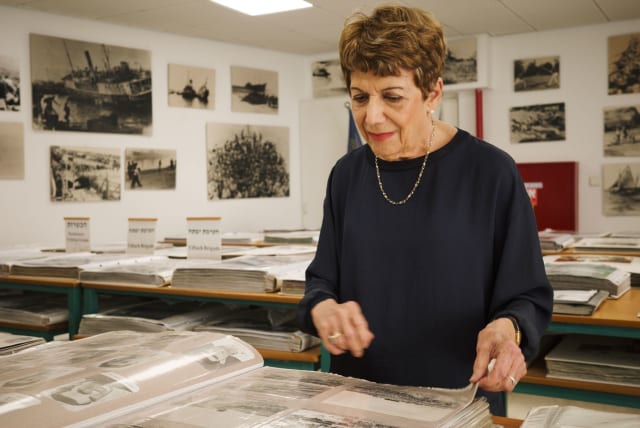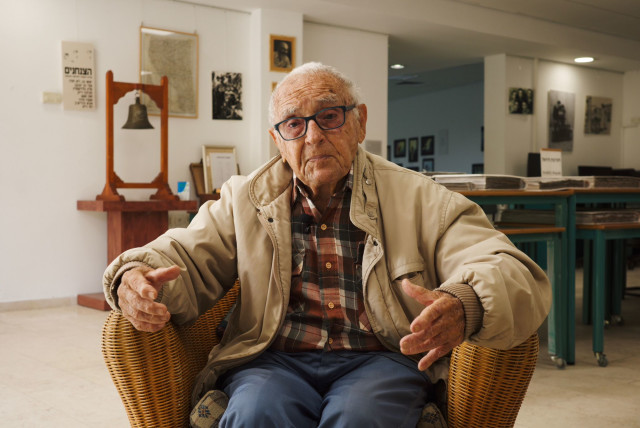On Israel’s 75th, founding fighters warn internal division could end Zionist dream

War of Independence fighters and a leading historian express concern over the rift brought about by the government’s judicial overhaul.
Israel’s founding fighters are worried.
As the country marks its 75th birthday, which begins on April 25th at sundown, those who fought in the 1947-1949 War of Independence are warning that a growing rift in the nation over the government’s controversial judicial overhaul legislation could extinguish the Zionist dream.
Weekly protests against the government
Hundreds of thousands of Israelis continue to hold weekly protests against Prime Minister Binyamin Netanyahu’s government and its plans to weaken the country’s judiciary. Some reservists are refusing to report for duty over the reforms, which they have labeled as dangerous and undemocratic.
Meanwhile, global risk assessment agency Moody’s recently downgraded Israel’s credit outlook amid a flurry of warnings from financial experts over the economic impact of the legislation.
Government and opposition representatives are holding ongoing talks in the hopes of reaching a compromise; however, Netanyahu has vowed to press on with the reforms if these discussions fail to bear fruit.
Amos Horev, who is turning 99 in June and who fought in the War of Independence as a commander in the elite Palmach force, told The Media Line that the country is on a dangerous path.
“We have a problem here and we are taking a hit,” Horev said. “The one thing that I can say is that we are still strong from a national security perspective. It hasn’t really harmed us, but the things that are happening here are unbelievable. I’ve done a lot for this country.”
Born in Jerusalem during the British Mandate, Horev joined the Palmach, a paramilitary organization that was one of the precursors of the IDF, when he was 14 years old.
He served under future Prime Minister Yitzhak Rabin during the 1947-1949 War.
“I was in the Harel Brigade’s 6th Battalion and we were in charge of protecting convoys during the conquest of Arab villages, which attacked the convoys,” Horev recounted. “It was a very tough war. The Harel Brigade lost many people.”
Horev, who has seven great-grandchildren and lives with his wife of 63 years in the city of Ramat Hasharon, wrote of his experiences in an autobiographical book that was published in Hebrew in 2020 (and which has not yet been translated).
In the decades that followed the war, Horev reached the rank of major-general in the IDF. Throughout his civilian career, he held a number of illustrious positions, becoming president of the prestigious Technion University and chairman of defense tech giant Rafael.
While he has not had to fight as a soldier for many years, he worries that the country is currently in a precarious state.
“Do I need a dictatorship here!? Are they crazy!?” Horev asked angrily. “Whose children are serving in the army? Is it those studying in the yeshivas? All of my children served [in the IDF]. My daughter’s husband was killed in action!”
The birth of a nation
Israel’s War of Independence took place between the newly created Jewish State and the combined armies of Lebanon, Syria, Iraq, Transjordan, Egypt, and other Arab nations. Almost 6,400 Israelis—both combatants and civilians—were killed, while the death toll among Arab fighters and civilians totaled between 6,700 and 20,000 people.
“The Jewish militias that participated were the Palmach, Haganah, Etzel and the Lehi,” Prof. (emeritus) of Tel Aviv University Anita Shapira told The Media Line. “The largest was the Haganah and the Palmach took part in the hardest battles. The Etzel and the Lehi were smaller but they also had an impact on the outcome of the war.”
Born in 1940 in the Warsaw Ghetto, Shapira’s mother smuggled her out of the ghetto and into a convent. In 1944, she was taken out of the convent and placed into an orphanage where she was later adopted by a Jewish family. They moved to Israel in 1948.
“My mother woke me up when the establishment of the State of Israel was declared,” Shapira recalled. “I remember it as if were today. It was midnight on a Friday. Since then I’ve lived for Israeli history.”
Like Horev, the award-winning historian and author—who has written numerous books on Israeli history—is also concerned about Israel’s internal turmoil.
“Today I’m worried, very worried because what we’re seeing here is a disappearance of solidarity and a loss of our common goals,” she related. “It’s super depressing. On the other hand, the fact that there is such a strong and dramatic protest shows that there is a new generation of Israelis that cares [about the country] and is concerned. This is a positive sign.”
Former Irgun fighter: ‘This wouldn’t be happening if Begin were in charge’
Others who fought in the War of Independence are also troubled, likening the situation to the Altalena Affair.
The Altalena Affair, which took place in June 1948, is considered to be one of the most divisive episodes in Israeli history. Just weeks after the state had been established, a civil war nearly broke out.
The Altalena was a ship carrying immigrants, a huge cache of weapons, and fighters from the Irgun or Etzel, a Zionist paramilitary group that was being absorbed into the newly-formed Israel Defense Forces. When the ship arrived on Tel Aviv’s shores, a violent confrontation broke out between the IDF and the Irgun, resulting in the deaths of 16 people.
“When then-Prime Minister David Ben-Gurion told forces to fire on the Altalena, Irgun members aboard wanted to return fire,” former Irgun fighter Haim Avni said to The Media Line. “But Menachem Begin, who was head of the Irgun, ordered them to hold their fire and said: ‘There will not be a civil war.’ Nowadays we are in a civil war: Roads are being blocked and we’ve become lawless. Still, I’m optimistic that we’ll get past this.
“The State of Israel is strong and I believe in it,” Avni continued. “The problem we have is that our enemies don’t have to do anything because we’ll destroy ourselves if we continue to be divided.”
Avni, 91, joined the Irgun when he was only 14, becoming one of the group’s youngest members. The organization carried out a number of deadly operations against the British before the founding of the State of Israel.
During the War of Independence, Avni helped them take over parts of Jaffa and the town of Yehud.
“I was placed in the explosives lab,” he recounted. “I was still just a boy and couldn’t really fight. I was given empty hand grenades and had to fill them with TNT. I would crawl between the fighters in Jaffa and distribute these grenades.”
As the fate of the judicial overhaul hangs in the balance and Israel celebrates its 75th birthday, the country’s founding generation hopes that it will be able to overcome its internal divisions.
For his part, Avni believes that both the pro- and anti-reform camps need to rethink their positions.
“I think that the people leading the reform made a mistake by trying to pass it all in one go instead of doing it piece by piece,” he said. “On the other side, the anti-reform camp is mistaken in their protests, refusal to serve, and threats.
“This wouldn’t be happening if Begin were in charge,” he added. “He knew how to govern, he was honest and he would know what to do.”
Jerusalem Post Store
`; document.getElementById("linkPremium").innerHTML = cont; var divWithLink = document.getElementById("premium-link"); if (divWithLink !== null && divWithLink !== 'undefined') { divWithLink.style.border = "solid 1px #cb0f3e"; divWithLink.style.textAlign = "center"; divWithLink.style.marginBottom = "15px"; divWithLink.style.marginTop = "15px"; divWithLink.style.width = "100%"; divWithLink.style.backgroundColor = "#122952"; divWithLink.style.color = "#ffffff"; divWithLink.style.lineHeight = "1.5"; } } (function (v, i) { });

